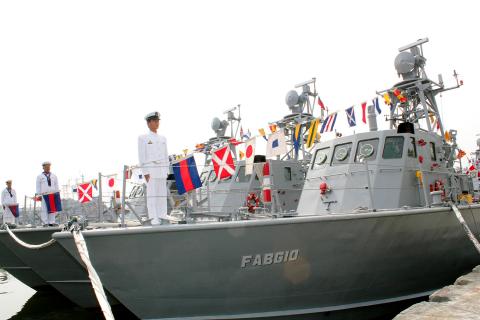Two classified naval charts were reported missing when an inventory was carried out amid the decommissioning of aging Hai Ou (“Seagull”) missile boats last month, and the information they contained could put navy vessels at risk during wartime, reports said yesterday.
According to the Chinese-language United Daily News, navy officers who had custody over the documents accidentally burned one of the two missing charts while destroying other documents, but the other, which contained classified information about naval deployments in the Taiwan Strait, remains unaccounted for.
The missing chart reportedly contained hydrographic data, ship information, waterways depth, sea salt fluctuation and the locations of navy vessels and submarines in wartime.

Photo: Military News Agency
The information could leave navy vessels exposed if it were to fall in enemy hands, reports said.
Naval Command said two control officers had received demerits over the affair and added that it had turned the case to a local military court for possible prosecution. It said it had also instructed all relevant units to tighten management of confidential information.
The navy decommissioned its last 20 Hai Ou missile boats during a ceremony at the Zuoying (左營) naval base in Greater Kaohsiung on July 1. The ships, whose design was inspired by Israel’s Dvora-class patrol boats, had been in service for about three decades. Each Hai Ou — a total of 50 were deployed — came equipped with locally produced Hsiung Feng I (HF-1) anti-ship missiles.
Amid modernization efforts, three squadrons of Kuang Hua VI (KH-6) radar-evading fast-attack missile boats have entered service since 2010. Each of the 31 KH-6s is armed with the more advanced HF-2 anti-ship missile.
The embarrassment over the disappearance of the classified chart comes after the Ministry of National Defense (MND) admitted last month that it had launched an investigation into the disappearance in May of a top-secret laptop used on a KH-6 vessel.
The computer, which belonged to the Chungshan Institute of Science and Technology’s (CSIST) — the nation’s top military research body — had been installed for a six-month period, during which the ship’s crew carried out tests of confidential communications equipment and procedures.
The Southern District Prosecutors’ Office is handling the investigation into the computer’s disappearance.
Additional reporting by CNA

ANOTHER EMERGES: The CWA yesterday said this year’s fourth storm of the typhoon season had formed in the South China Sea, but was not expected to affect Taiwan Tropical Storm Gaemi has intensified slightly as it heads toward Taiwan, where it is expected to affect the country in the coming days, the Central Weather Administration (CWA) said yesterday. As of 8am yesterday, the 120km-radius storm was 800km southeast of Oluanpi (鵝鑾鼻), Taiwan’s southernmost tip, moving at 9kph northwest, the agency said. A sea warning for Gaemi could be issued tonight at the earliest, it said, adding that the storm is projected to be closest to Taiwan on Wednesday or Thursday. Gaemi’s potential effect on Taiwan remains unclear, as that would depend on its direction, radius and intensity, forecasters said. Former Weather Forecast

As COVID-19 cases in Japan have been increasing for 10 consecutive weeks, people should get vaccinated before visiting the nation, the Centers for Disease Control (CDC) said. The centers reported 773 hospitalizations and 124 deaths related to COVID-19 in Taiwan last week. CDC Epidemic Intelligence Center Director Guo Hung-wei (郭宏偉) on Tuesday said the number of weekly COVID-19 cases reported in Japan has been increasing since mid-May and surpassed 55,000 cases from July 8 to July 14. The average number of COVID-19 patients at Japan’s healthcare facilities that week was also 1.39 times that of the week before and KP.3 is the dominant

The Chinese Communist Party’s (CCP) working group for Taiwan-related policies is likely to be upgraded to a committee-level body, a report commissioned by the Mainland Affairs Council (MAC) said. As Chinese President Xi Jinping (習近平) is increasingly likely to upgrade the CCP’s Central Leading Group for Taiwan Affairs, Taiwanese authorities should prepare by researching Xi and the CCP, the report said. At the third plenary session of the 20th Central Committee of the CCP, which ended on Thursday last week, the party set a target of 2029 for the completion of some tasks, meaning that Xi is likely preparing to

US-CHINA TRADE DISPUTE: Despite Beijing’s offer of preferential treatment, the lure of China has dimmed as Taiwanese and international investors move out Japan and the US have become the favored destinations for Taiwanese graduates as China’s attraction has waned over the years, the Ministry of Labor said. According to the ministry’s latest income and employment advisory published this month, 3,215 Taiwanese university graduates from the class of 2020 went to Japan, surpassing for the first time the 2,881 graduates who went to China. A total of 2,300 graduates from the class of 2021 went to the US, compared with the 2,262 who went to China, the document showed. The trend continued for the class of 2023, of whom 1,460 went to Japan, 1,334 went to